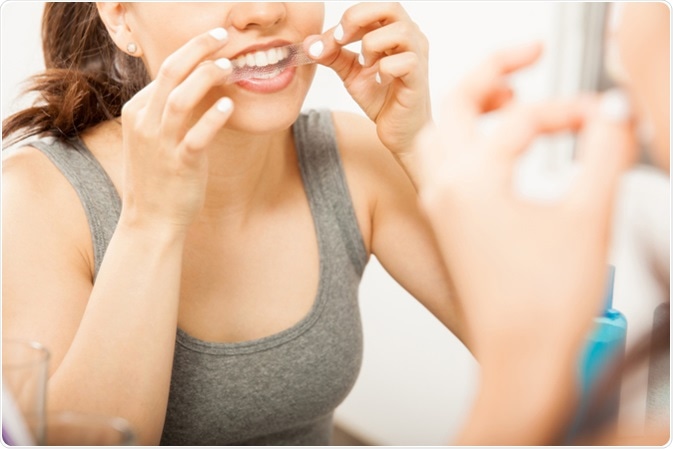Teeth whitening is amongst one of the most popular procedures in dentistry. Teeth whitening makes teeth appear whiter, stain-free and makes the smile more aesthetically pleasing.
There is a wide range of home-based teeth whitening products like toothpastes, films, and gels. Teeth whitening performed by dentist consists of bleaching agents. These bleaching agents are high in chemical composition and need to be applied carefully by a dentist.
How Does Teeth Whitening Work?
The active component in most of the chemical teeth whitening products is composed of hydrogen peroxide (H2O2), which is released in the form of hydrogen peroxide or carbamide peroxide. Carbamide peroxide is a stable compound which disintegrates when contacted with water and releases hydrogen peroxide. Bleaching is a chemical process which removes chromogens responsible for tooth staining. Chromogens either accumulate superficially on the tooth structure causing extrinsic stains or slowly settle under the teeth leading to internal or intrinsic stains. Broadly, chromogens are classified into two groups:
- Chromogens which are composed of large organic compounds and contain conjugated double bonds
- Chromogens which are primarily composed of metal compounds
Tooth bleaching of chromogens, which are primarily composed of organic compounds, involves the dissolution of double bonds present in the organic chromogens. It has been observed that bleaching chromogens which are metallic in nature are tougher when compared to bleaching the organic chromogens.
Other options that are available to bleach metallic chromogens include tooth veneers or crowns. There is a wide range of teeth whitening products available to remove the stains. Selection of the whitening product usually depends upon the type of stain requiring the removal. However, broadly they are classified as:
- Cleansers like certain toothpastes which are chiefly composed of detergents and abrasives which help in the removal of chromogens from the tooth surfaces
- Bleaching agents which undergo a reaction with chromogens and lighten the color of discolored teeth
- Products which have both cleansing and bleaching reaction.
Home-based whitening kits are primarily suitable to lighten the milder stains, whereas harder stains are usually treated by a dentist. Treatment of end-point for teeth whitening depends on the time for which the bleaching agent is exposed and the extent of its concentration.
According to the American Academy of Cosmetic Dentistry, teeth whitening agents that can be used at home are:
Whitening Toothpastes
These pastes are primarily composed of large amounts of abrasives and detergents. These are primarily composed of low amounts of carbamide peroxide or hydrogen peroxide that aid in tooth lightening. However, these pastes do not have bleaching agents like sodium hypochlorite for lightening teeth. A recommended usage makes the teeth appear 1-2 shades lighter.
Over the Counter Whitening Strips and Gels
Whitening Strips are plastic strips which are fabricated in a way that they appropriately fit in the buccal or outer visible portions of the teeth. They slowly release peroxide gel which aid in teeth whitening. They are recommended for self-application and can be applied for a span of 30 minutes for 2 weeks. Whitening gels contain peroxide and can be applied on the tooth surface with the help of a brush and are usually instructed to be self-applied two times a day. Strips and gels also make the teeth appear one to two shades lighter.

Woman applying a whitening strip on her teeth. Image Credit: antoniodiaz / Shutterstock
Whitening Rinses
These oral rinses are composed of oxygen constituents like hydrogen peroxide and eventually react with the chromogens. Rinsing with them is recommended two times a day for about 60 secs. Tooth lightening is usually observed after 3 months of regular usage.
Tray-Based Teeth Whiteners
These trays can be both self applied or professionally by a dentist. A well fitted tray containing carbamide peroxide-bleaching gel can be applied for 2 to 4 hours during the day time or while sleeping over the night. This type of tooth lightening product also makes the teeth appear 1-2 shades lighter.
Adverse Effects of Teeth Whitening
At home teeth whitening procedures are generally safe for use; however, they do pose some adverse effects if they are not judiciously or cautiously used.
A long-term and unwarranted use of teeth whitening products can severely affect dental health. These products should never be used without the advice of a trained dental professional. Also, they must be applied for the recommended time frame only which usually lasts for 14 days.
The user must also not rely on all the teeth whitening products available in the market. It is advisable to use the products suggested by a registered dentist or products which holds the seal of America Dental Association or a local government body which makes these products licensed to be sold in the market.
Here is a list of few adverse effects of teeth whitening products if they are not applied correctly:
- Teeth become sensitive after a prolonged usage
- Periodontal problems like mild gingival irritation
- Loss of mineral content of teeth
- Increased risk for demineralization of teeth
- Damage to the pulp of the teeth
- Tooth erosion
Even though, teeth whitening makes teeth appear whiter and stain-free; however, recent research has indicated potential long-term hazards and side effects associated with this procedure like discoloration and damage of dental fillings.
Further Reading
Last Updated: Feb 17, 2023